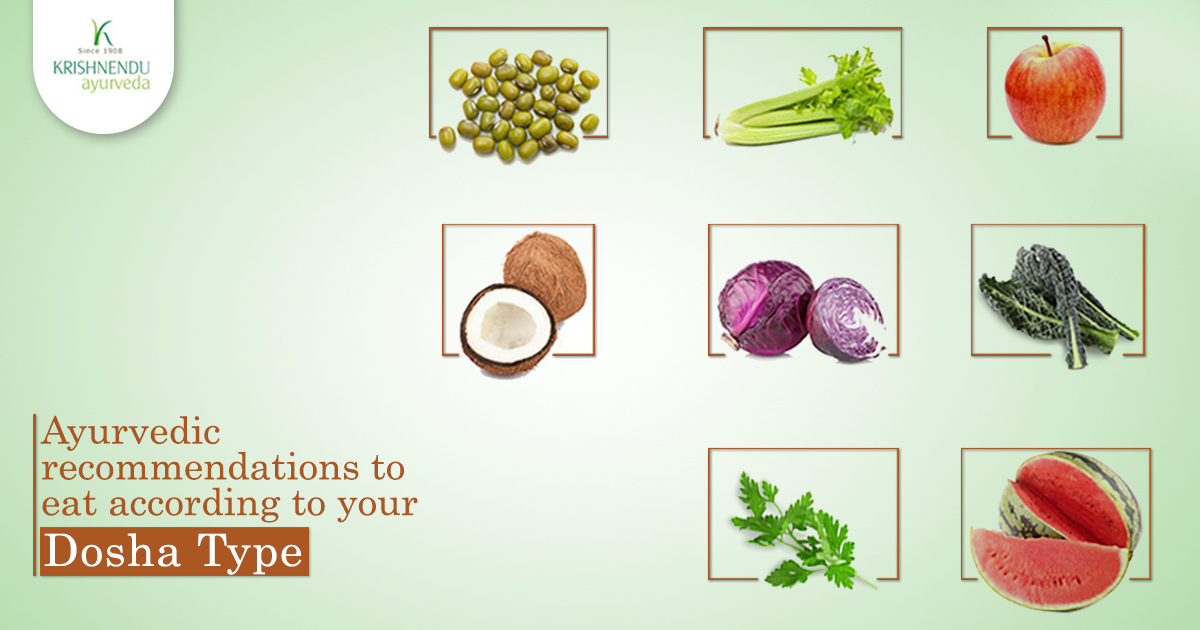Ayurveda emphasizes on ‘ahara’ or proper diet as vital for promoting optimum health. And Ayurvedic texts identify six major tastes that should be included in the daily diet as sweet, sour, salty, pungent, bitter and astringent. As these six tastes also influence the doshas, it is important to know what to eat according to an individual’s dominant dosha.
Here is an Ayurvedic guide to eat according to one’s dominant dosha.
Vata
Being a dry dosha, Vata types require warm and nourishing foods that also help calm their tendency towards anxiety and over activity. Heavy cooked foods that are served warm are the most soothing. Vata pacifying foods include sweet and salty tastes, along with warm, moist and easily digestible food choices like,
- Boiled or steamed starchy vegetables like broccoli, cauliflower, leafy vegetables, zucchini etc.
- Ripe fruits such as avocados, bananas, berries, cherries, coconut, mangoes, peaches, sour oranges, etc.
- Warm milk, cream, butter
- Soupy grains like rice and wheat
- Mild spices like cumin, ginger, cardamom, cinnamon, fennel, coriander, salt, cloves, mustard, black pepper
- Teas of camomile, fennel, ginger, lemon, liquorice etc.
Pitta
Pitta is a fiery dosha and needs to be cooled down. They also have better appetites and better digestion. Pitta balancing should be using sweet, bitter, astringent tastes and cool and heavy foods including,
- Boiled, steamed or raw vegetables which are sweet and bitter like asparagus, cabbage, radish, celery, cucumber, green beans, leafy greens, sweet potatoes, carrot, etc.
- Sweet fruits like bananas, cherries, mangoes, melons, pineapples, prunes, plums, etc.
- Moderate amounts of dairy
- Soupy grains like rice, wheat, barley and oats
- Mild and cooling spices like coriander, cardamom, cloves, turmeric, cumin, curry leaves, mint, etc.
- Teas of camomile, peppermint, spearmint, liquorice, red clover, etc.
Kapha
Kapha types tend to be sluggish and cool and needs to be stimulated and warmed up. Kapha-pacifying foods include light, dry, warm, pungent, bitter and astringent tastes like,
- Boiled, steamed or raw vegetables like beetroot, broccoli, cabbage, carrot, leafy green vegetables, mushrooms, okra, potatoes, sprouts, etc.
- Ripe fruits like apples, apricots, berries, cherries, papaya, cranberries, pears, pomegranates, grapefruit, etc.
- Fat-free buttermilk
- Grains like corn, millet, rye, oats, barley, wheat bran
- Strong spices like pepper, paprika, garlic, basil, cloves, allspice, fennel, mustard, turmeric, ginger, cumin, cardamom, cinnamon, coriander, black pepper, etc.
- Honey is recommended instead of sugar
- Teas of cinnamon, fenugreek, peppermint, raspberry.





